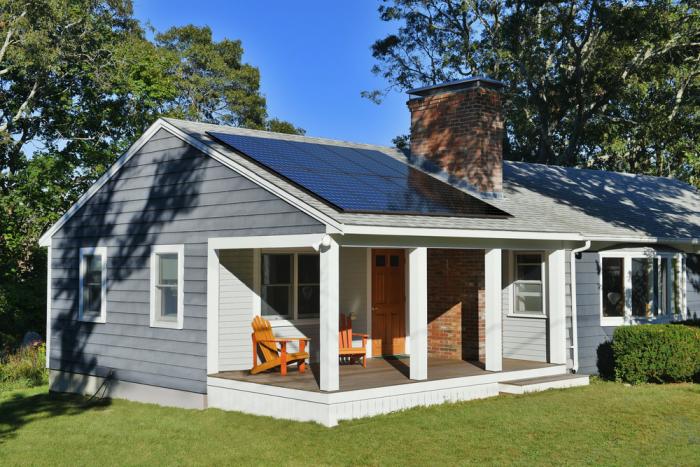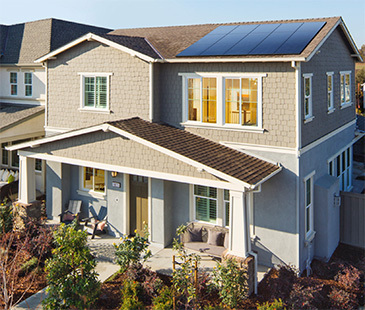
Editor’s Note: In 2020, SunPower announced the completion of the strategic spin-off of its manufacturing division into a separate business named Maxeon Solar Technologies, Ltd. As a result, SunPower has expanded its offerings to drive future growth. The SunPower Equinox® system now offers multiple panel options, including front- and back-contact panels, all of which are responsibly and rigorously quality tested to provide the best energy solution for your home.
For homeowners interested in adding photovoltaic (PV) solar panels to their homes or businesses, 2021 has already gotten off to a great start. Just before ringing in the new year, Congress extended the deadline for the federal solar investment tax credit (ITC) which can offset the tax debt of many owners of residential, commercial and utility-scale solar projects. As a result, eligible solar enthusiasts may be able to take advantage of a 26% tax credit of the cost of their systems.*Tax credits subject to change. SunPower does not warrant, guarantee or otherwise advise its partners or customers about specific tax outcomes. Consult your tax advisor regarding the solar tax credit and how it applies to your specific circumstances. Please visit the dsireusa.org website for detailed solar policy information.
Switching to solar power can be done in just four easy steps.
1. Find a solar installer
What’s the best way to go solar? Begin by finding the right solar installer for your home. Ask friends that have already installed a solar system for recommendations or consult popular review sites. Then, check out SunPower’s nationwide network of third-party approved dealers, who receive specialized training to install SunPower’s highly efficient solar panels.
Your solar installer will ask you questions about your home to learn about your utility and monthly electric bills. Every home has a different orientation to the sun, so your installer will want to evaluate your home’s configuration and roof space. Information about your roof like its age (flat or pitched) and composition (shingles, tiles or clay) are important to factor into the solar estimation, design and installation process.
2. Review and choose a financing solution
After giving you an estimate, the installer will provide solar financing options that can help you determine the best option to qualify for the ITC as well as other state and local financial incentives. There are three main financing options: purchase, loan or lease.*Homeowners who lease solar cannot benefit directly from the ITC. However, they may benefit through reduced monthly payments. All have important advantages, and your solar dealer or energy consultant can help you evaluate which works best for you.
3. Coordinate with local authorities
An experienced SunPower-certified installer or installation contractor will handle all the details involved in preparing your house for solar energy, including rooftop surveys and applications. Every local government has different permitting and building code standards and they change frequently. SunPower dealers have strong relationships with local permitting offices and inspectors to ensure that your installation goes smoothly. They also know the ins and outs of working with local utilities and homeowners’ associations.
4. Install and activate the system
A project manager will make sure you’re kept up to date throughout the installation process. Once a work crew arrives at your house, the installation should take no more than two to three days, depending on the size and scale of the installation. After it is completed, an inspector from your utility or local electric authority will give the thumbs up on your system. With that, you’ll be ready to start generating your own clean energy.
The bottom line
Buying solar is a long-term investment, so you’ll also need to know about the warranty that covers your installation. SunPower offers a 25-year Power and Product Warranty for home use. Save yourself the trouble and use a system built by one company, like SunPower’s Equinox platform. Mix-and-match systems with parts cobbled together from different manufacturers can lead to a major headache because each component will come with separate warranties.
SunPower can commit to such a strong warranty because it uses solar panels that are specifically designed for durability and efficiency. SunPower solar panels are built on a solid copper foundation that helps them hold up better than conventional panels, even after years of exposure to wind, rain, snow and all kinds of weather. In fact, SunPower panels are 35 percent more efficient at generating energy than conventional panels.*SunPower 400 W, 22.6% efficient, compared to a Conventional Panel on same-sized arrays (280 W multi, 17% efficient, approx. 1.64 m²).
Make this the year you finally go solar with SunPower. Find out more specifics about how you can lower your electric bill and help the environment on SunPower’s website or by calling 1-800-SUNPOWER.

